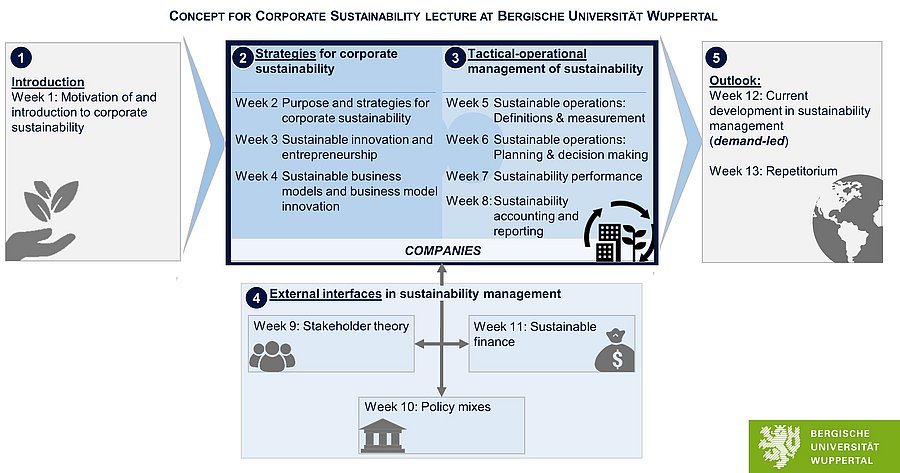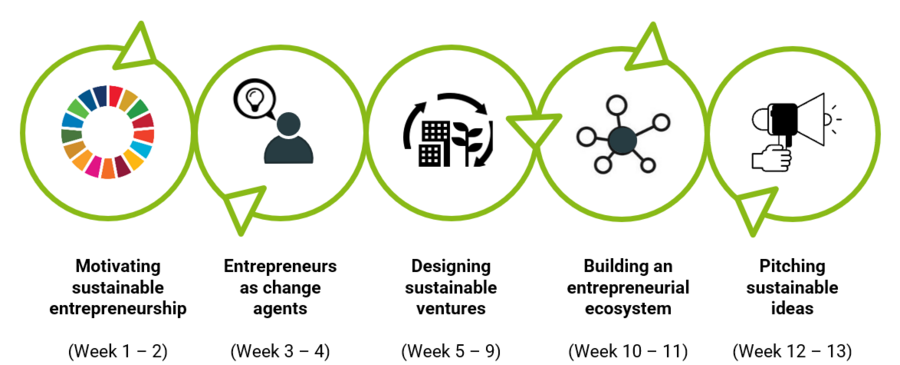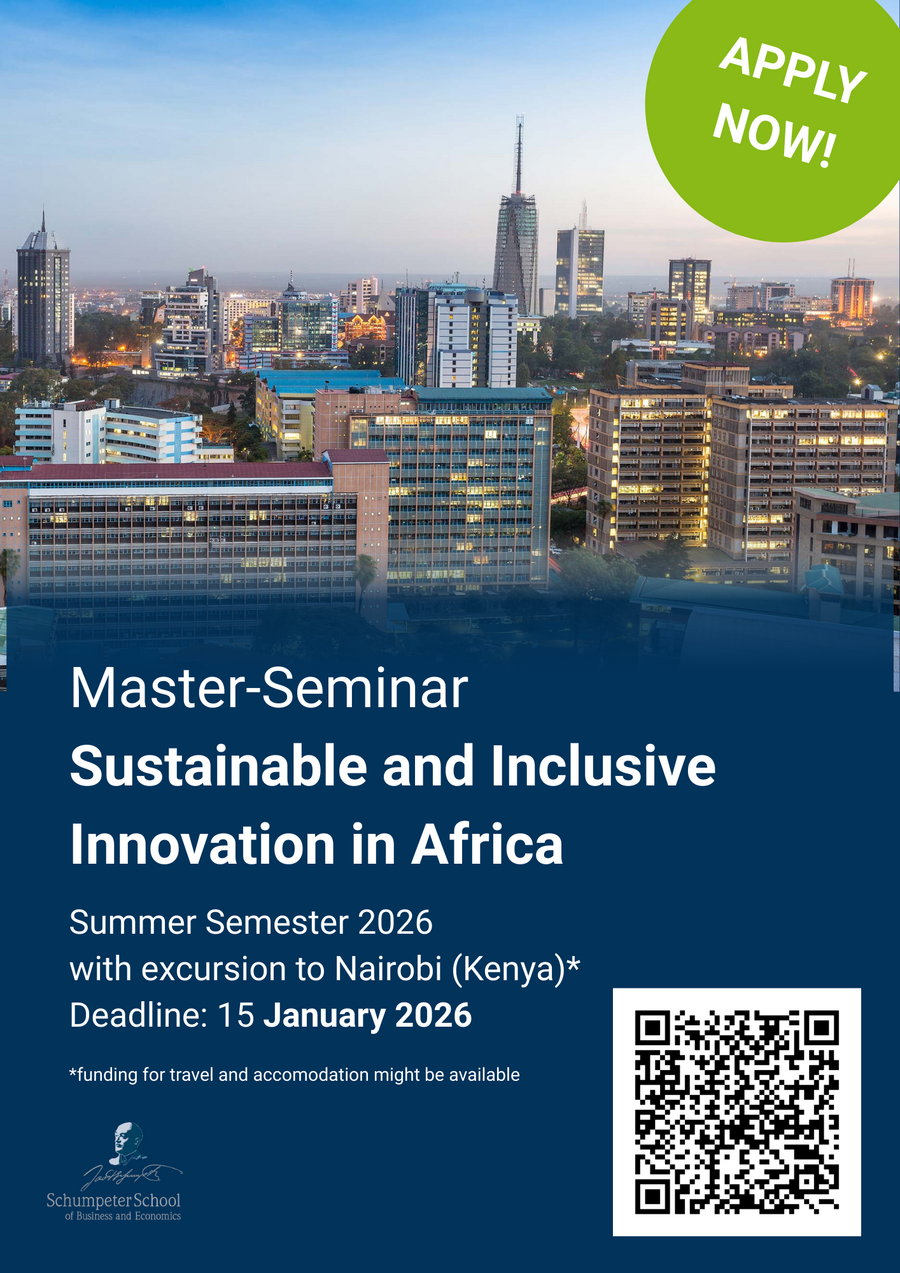Course Offers
The Professorship in Sustainability Management currently offers two modules and changing seminars for MSc students. Prof. Trotter also supervises Master theses in the area of Sustainability Management.
Module: Corporate Sustainability
(formally Betriebswirtschaftliche Aspekte des Sustainability Managements)
Taught in the winter semester.
Companies are key agents in global sustainability transitions, both as causes of breaching planetary boundaries, and as drivers for innovation which enable the transition towards sustainability. The course “Corporate Sustainability” offers an introduction to corporate sustainability in five components (Figure 1). The theoretical concepts and numerous case studies discussed in the course allow student to understand the implications of sustainability for businesses, to transfer corporate strategies into action, and to examine business processes and value chains for economic, ecological and social sustainability. Specifically, students first learn about definitions and drivers of corporate sustainability (component 1), before they are introduced to basic types of corporate sustainability strategies (component 2). The students learn to systematically characterise different sustainability strategies and to assess technological and business model innovations in the context of sustainability in different phases of a company. They learn organisational, qualitative and quantitative approaches for tactical-operational planning and control as well as evaluation of sustainability activities in component 3, and will be able to identify interactions with central external actors in component 4 which features legal regulations of business sustainability reporting as well as the interactions between corporate sustainability and the capital market. Finally, the students learn to apply the sustainability concepts presented to companies in different geographies, and thus to recapitulate and critically question them (component 5).

Figure 1: Concept of the Corporate Sustainability Module
Module: Entrepreneurship for Sustainability Transitions

Taught in the winter semester.
The course "Entrepreneurship for Sustainability Transitions" equips students with a comprehensive understanding of how entrepreneurship can drive sustainability transitions and contribute to achieving the Sustainable Development Goals (SDGs). It explores the challenges, opportunities, and operational models of sustainable entrepreneurship, focusing on key areas like climate change, biodiversity, environmental preservation, and sustainable economic development. Students will learn key theories on the nexus between entrepreneurship and sustainability, while developing the ability to turn sustainability challenges into entrepreneurial opportunities. The course emphasizes practical experience where students form small groups and over the course of the semester simulate the process of founding their own sustainable start-up. This includes finding an opportunity for sustainable development impact, as well as creating a strategy, a business model and a pitch deck. Students will engage with design thinking and other creative methods to address socio-ecological challenges, critically apply theories of sustainable entrepreneurship, and understand the process of designing social or environmental ventures.
Seminar on Sustainable and Inclusive Innovation in Africa

Taught in the summer semester 2026.
Global sustainability challenges require management skills that operate across cultural, political, and ecological contexts. Yet academic training in economics and management still focuses predominantly on European environments. This leaves future business leaders with limited exposure on how sustainability transitions unfold in other regions such as Sub-Saharan Africa.
This seminar enables students to move outside this box and understand how African businesses and communities navigate sustainability transitions and develop context-appropriate innovations using Kenya as the learning context. The country offers a dynamic landscape shaped by rapid economic growth, environmental pressures, and vibrant social entrepreneurship. By combining theoretical foundations with field-based experience, the seminar allows students to explore alternative models of resource management, circular economy solutions, renewable energy initiatives, and social entrepreneurship.
During the preparatory phase, students engage with sustainability management theories, systems thinking, and transition frameworks. Based on briefing documents from Kenyan partner organisations, groups develop project ideas and examine real sustainability challenges. In Kenya, students participate in:
- Visits to local businesses, NGOs, and sustainability initiatives
- Workshops with entrepreneurs, policymakers, and community partners
- Lectures by Kenyan researchers and experts
- Cultural activities fostering intercultural understanding
The excursion to Kenya will take place in late August to early September of 2026. Students will analyse the technical, social, and environmental context of their project, interact with partners, and propose evidence-based solutions. After returning, they prepare reflective essays and group presentations linking empirical insights with theory.
For the excursion we are currently in the process of acquiring funding, which will be available to participants, however at this point the amount is to be determined. Total costs are going to be arond 1500€. For further questions please contact krebs@wiwi.uni-wuppertal.de
The seminar is offered by the Chair of Sustainability Management in cooperation with the UNESCO-Chair for Entrepreneurship and Intercultral Management. It can be accredited to the Modules "Corporate Sustainability", "Entrepreneurship for Sustainability Transitions" and others on request.
Interested students can apply until 15 January 2026 via this link.
Seminar Debates on Climate Economics
Taught in the winter semester by Dr. Maximiliane Sievert.
Climate change is among the most pressing challenges of the 21st century. The complexity of climate policy arises from its deep interconnections with science, economics, ethics, and politics. As governments debate ambitious policies—especially in Europe and Germany—on how to decarbonize energy systems, it is crucial to recognize that climate change is a global phenomenon with local, national, and intergenerational consequences. It raises not only technical and economic questions, but also fundamental issues of fairness and political feasibility.
This seminar investigates the economics of climate change with a focus on how economic concepts, models, and controversies shape climate policy. We will explore how economists estimate the damages of climate change and the social cost of carbon, assess the merits and drawbacks of carbon pricing, and examine the distributional effects of these policies within and across countries. We will also engage with broader debates such as green growth versus degrowth, the employment effects of climate policy, and the economic and political feasibility of technologies like geoengineering and carbon capture. The seminar will be interactive and discussion oriented. While critical examination of the scientific literature is at the core, we will also engage with media and policy debates.
The seminar language (including seminar paper, presentation, and discussions) will be English.
The seminar will take place as a block seminar and in-person at University Wuppertal.
Registration: To register, please send an email by September 9, 2025, to sievert@rwi-essen.de. Please also send your three preferences from the list of topics ordered by priority. Topics will be assigned during the first meeting on October 27th.


